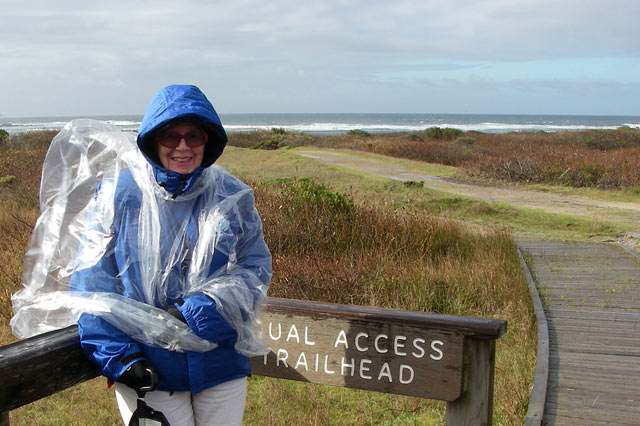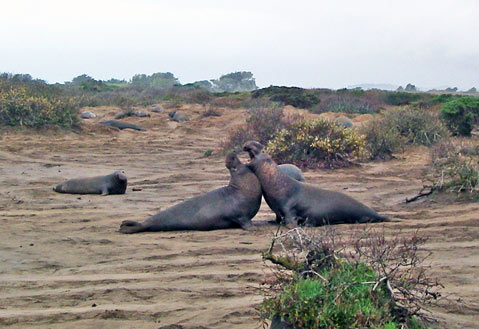Ahh, Año Nuevo
Elephant Seal Brawls and Equal Access for All Ages at Coastal Nature Reserve

Someone yells, “Fight!”, and cameras start clicking. Two sumo-like northern elephant seal males or bulls, each about 12 years old and weighing 4,000 pounds, battle for dominance. The rules differ from a sumo match though. There is no elaborate opening ritual only snorts and guttural sounds. The winner won’t be declared by pushing the loser out of a ring but instead the loser will end up, sometimes a bit bloody, back in the ocean.
Tremendous energy is required by both bulls but the reward is the harem of females. Our little group of tourists is huddled close together, only yards from the surf, on a desolate point along the rugged Pacific Coast 290 miles north of Santa Barbara and 55 miles south of San Francisco. I’m wearing multiple layers of clothes struggling to keep my rain poncho in place. I doubt this windswept spot has changed much since the Spanish explorer Don Sebastian Vizcaino sailed by in 1603 and a chaplain on board named it for the day it was spotted: Punto del Año Nuevo, for “New Year’s Point.”
Año Nuevo is a place shaped by time where northern elephant seals, sea lions, and other marine mammals come ashore to mate and give birth on one of the few remaining sand dune fields along the coast that hasn’t been destroyed by humans. It is one of the most important pinniped rookeries in California. Pinniped means “fin footed” and refers to both true seals (harbor and elephant seals) and eared seals (sea lions and fur seals).
California purchased Año Nuevo in 1958 and created Año Nuevo State Reserve. The reserve now includes 1,000 acres of dunes and beaches. In 1956, almost 3,000 acres of mountains bordering the reserve were added and named Año Nuevo State Park. Año Nuevo’s main attraction is the northern elephant seal and there are about 3,000 year-round residents. From the lookout, our group can see about 50 mammals, consisting of a mix of large bulls, sub-adult bulls, females, pups, and a few yearlings. The bulls at Año Nuevo may be 14 feet long and weigh 2 1/2 tons. The inflatable trunk-like nose is their most prominent feature. The females are smaller and around 12 feet long. They breed and give birth to their five-foot-long pups here on the dunes in December and January.

The northern elephant seal is one of the deepest diving marine mammals. They spend 80 to 90 percent of their time at sea underwater, start looking for food at about 1,000 feet and can dive almost a mile. There is much unknown about northern elephant seals and research is ongoing about these spectacular animals including how they navigate while submerged.
From December 15 to March 31, there are regularly scheduled guided walks to see northern elephant seals. The walks take about two-and-a-half hours over three miles of mostly loose sand. For old people like me — coping with a resurfaced back injury — there is, fortunately, another option: an Equal Access Program. During the breeding season, between 300 to 500 visitors go out on these tours.
A wheelchair accessible van transported our group the one-and-a-half miles from the Visitor Center. When the rain stopped, all of us were able to leisurely stroll the 1,100-foot-long boardwalk constructed over the dunes with Cheryl, our volunteer docent. On our way to the lookout, we walked past sleeping elephant seals sometimes almost hidden in native grasses.
The battle between the two enormous elephant seal bulls doesn’t last long. The bull going downhill obviously has the leverage advantage, but maybe that isn’t coincidence but the result of years of experience. When a voice in our group says “that looks like submission,” we glance up toward dark clouds sliding across the sky and make our way back to the van.
4•1•1
Año Nuevo State Park is located on State Highway 1 between Santa Cruz and Half Moon Bay.
Guided walks are offered from December 15 through March 31. Advance Reservations are recommended for these guided walks. Call 1-800-444-4445. The Equal Access program is available Saturday and Sunday during the breeding season. Call 650- 879-2033 beginning in December between 1:00 pm and 4:00 pm. Mondays, Wednesdays, and Fridays.



